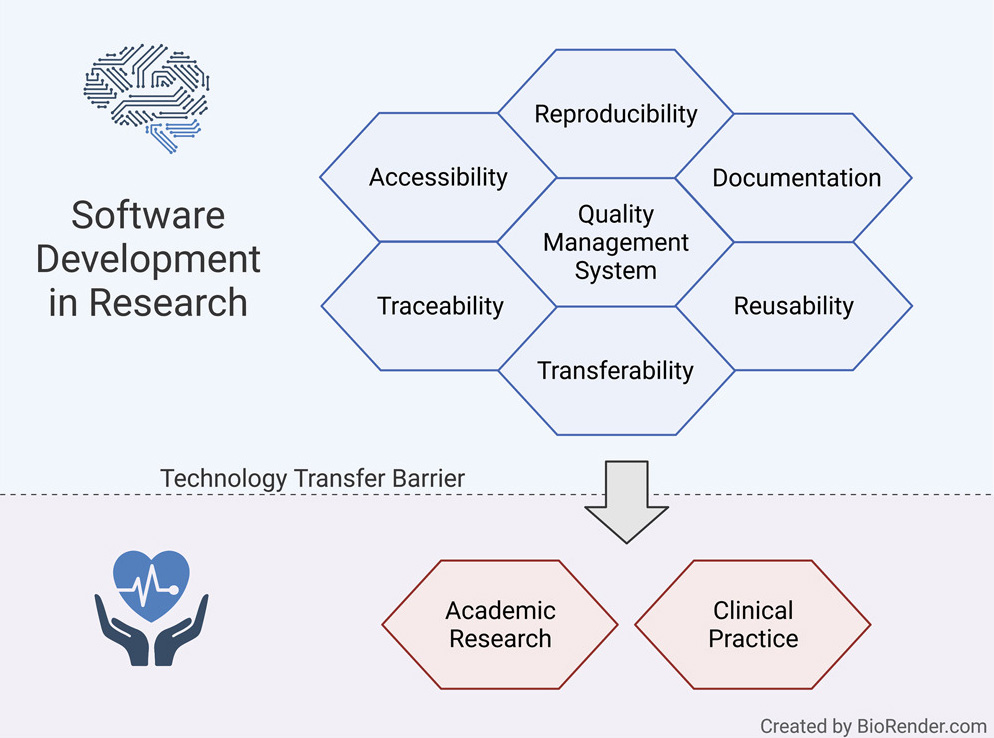Difference between revisions of "Template:Article of the week"
Shawndouglas (talk | contribs) (Updated article of the week text) |
Shawndouglas (talk | contribs) (Updated article of the week text) |
||
| Line 1: | Line 1: | ||
<div style="float: left; margin: 0.5em 0.9em 0.4em 0em;">[[File: | <div style="float: left; margin: 0.5em 0.9em 0.4em 0em;">[[File:Abst1 Hauschild iScience2021 24-7.jpg|240px]]</div> | ||
'''"[[Journal: | '''"[[Journal:Fostering reproducibility, reusability, and technology transfer in health informatics|Fostering reproducibility, reusability, and technology transfer in health informatics]]"''' | ||
Computational methods can transform healthcare. In particular, [[health informatics]] combined with [[artificial intelligence]] (AI) has shown tremendous potential when applied in various fields of medical research and has opened a new era for precision medicine. The development of reusable biomedical software for research or clinical practice is time-consuming and requires rigorous compliance with [[Quality (business)|quality]] requirements as defined by international standards. However, research projects rarely implement such measures, hindering smooth technology transfer to the research community or manufacturers, as well as reproducibility and reusability. Here, we present a guideline for [[quality management system]]s (QMS) for academic organizations incorporating the essential components, while confining the requirements to an easily manageable effort. It provides a starting point to effortlessly implement a QMS tailored to specific needs and greatly facilitates technology transfer in a controlled manner, thereby supporting reproducibility and reusability. ('''[[Journal:Fostering reproducibility, reusability, and technology transfer in health informatics|Full article...]]''')<br /> | |||
<br /> | <br /> | ||
''Recently featured'': | ''Recently featured'': | ||
{{flowlist | | {{flowlist | | ||
* [[Journal:Development of a core competency framework for clinical informatics|Development of a core competency framework for clinical informatics]] | |||
* [[Journal:Strategies for laboratory professionals to drive laboratory stewardship|Strategies for laboratory professionals to drive laboratory stewardship]] | * [[Journal:Strategies for laboratory professionals to drive laboratory stewardship|Strategies for laboratory professionals to drive laboratory stewardship]] | ||
* [[Journal:Cybersecurity impacts for artificial intelligence use within Industry 4.0|Cybersecurity impacts for artificial intelligence use within Industry 4.0]] | * [[Journal:Cybersecurity impacts for artificial intelligence use within Industry 4.0|Cybersecurity impacts for artificial intelligence use within Industry 4.0]] | ||
}} | }} | ||
Revision as of 16:08, 16 May 2022
"Fostering reproducibility, reusability, and technology transfer in health informatics"
Computational methods can transform healthcare. In particular, health informatics combined with artificial intelligence (AI) has shown tremendous potential when applied in various fields of medical research and has opened a new era for precision medicine. The development of reusable biomedical software for research or clinical practice is time-consuming and requires rigorous compliance with quality requirements as defined by international standards. However, research projects rarely implement such measures, hindering smooth technology transfer to the research community or manufacturers, as well as reproducibility and reusability. Here, we present a guideline for quality management systems (QMS) for academic organizations incorporating the essential components, while confining the requirements to an easily manageable effort. It provides a starting point to effortlessly implement a QMS tailored to specific needs and greatly facilitates technology transfer in a controlled manner, thereby supporting reproducibility and reusability. (Full article...)
Recently featured:










